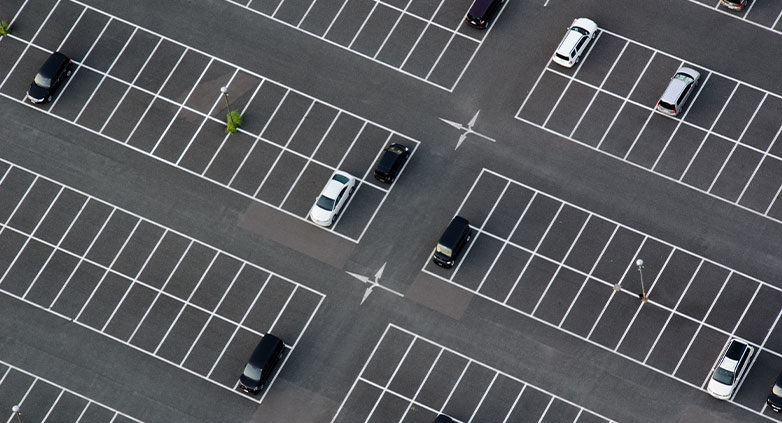Asphalt Parking Lot – Paving, Cost, and Maintenance
Why should you choose an asphalt parking lot for your business? Among the many decisions, you’ll make for your business is what kind of parking lot you want for your customers. While you also have options like gravel or concrete, asphalt is arguably the best choice for parking lot paving due to its versatility, cost, safety, and longevity.
Compared to concrete, asphalt parking lots cost less to install and repair, take less time to install, last nearly as long, are better for the environment, and look equally as professional as their counterparts. Asphalt also performs better than concrete in climates subject to freeze and thaw. Overall, asphalt parking lot paving simply offers more benefits and a better value for your money than the other available options.
Read on to learn nine essential elements of asphalt parking lot paving in this comprehensive guide.
8 Steps to Pave an Asphalt Parking Lot
Paving an asphalt parking lot is a significant project that requires careful planning, precise execution, and a thorough understanding of construction materials and techniques. Here, we’ll delve into an eight-step process that outlines how to pave an asphalt parking lot effectively.
1. Clear the existing site
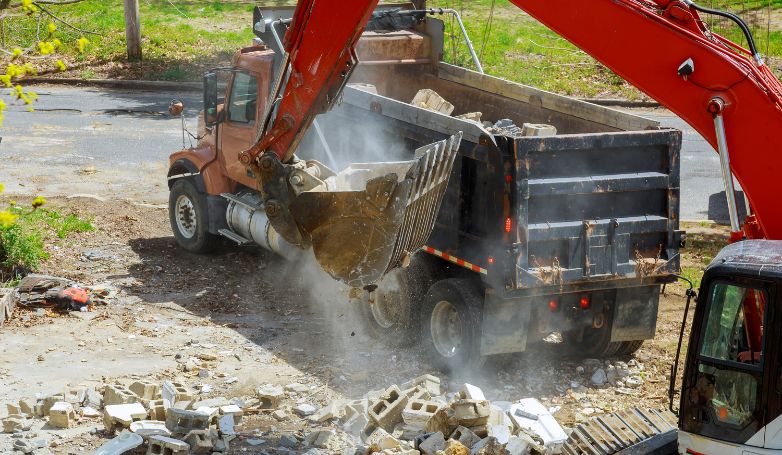
Clearing the site is the first and most critical step in asphalt parking lot paving. This involves meticulously removing existing structures, debris, or vegetation. The aim is to establish a pristine and level area for construction. Removing all obstacles is essential to prevent future structural problems in the parking lot, ensuring a solid foundation for the upcoming work.
2. Grade and level the ground
Ground grading is pivotal for achieving stability and efficient drainage. This step encompasses the careful leveling of the ground and crafting a gentle slope for optimal water runoff. Proper grading is a defense against water accumulation, which can significantly impair the integrity and lifespan of the asphalt over time.
3. Install geotextile fabric
The installation of geotextile fabric is a crucial step in parking lot construction. This fabric acts as a barrier between the subsoil and the aggregate base, enhancing overall stability, preventing material intermixing, and facilitating better drainage. It plays a significant role in prolonging the parking lot’s lifespan by protecting the underlying layers.
4. Spread aggregate base
Applying the aggregate base is fundamental in creating a stable foundation for the asphalt. This layer, typically made of crushed stone or gravel, is compacted to form a robust base. The choice of material and its thickness are tailored to suit the anticipated load and traffic volume, ensuring a durable and resilient parking lot surface.
5. Apply asphalt
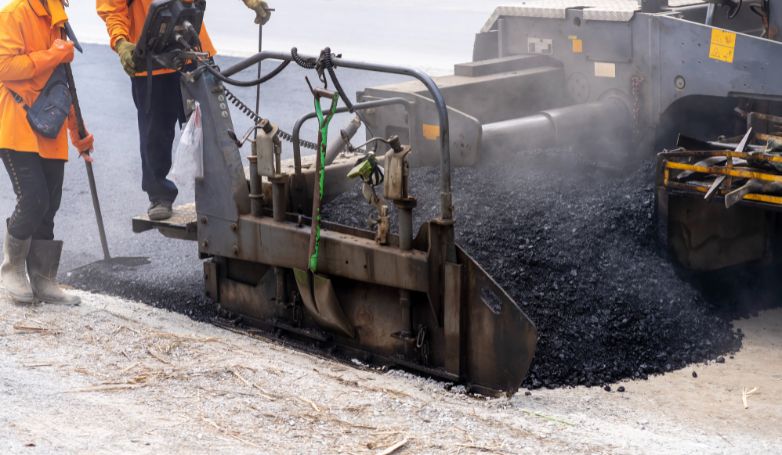
The meticulous application of the asphalt layer is a critical step in creating a durable and aesthetically pleasing parking lot. This delicate process involves carefully selecting the appropriate mix, closely monitoring temperature conditions, and ensuring precision in thickness. These factors collectively contribute to the structural integrity and overall quality of the asphalt parking lot’s surface.
6. Use paving machine
Utilizing a paving machine is critical for the even and uniform application of asphalt. This machine streamlines the process, ensuring consistent thickness and surface smoothness. It is an indispensable tool in the paving process, instrumental in achieving professional-grade and enduring results.
7. Compact the asphalt
Compacting the asphalt with a roller is a necessary step post-application. This process is key to eliminating air pockets and ensuring the asphalt is compactly packed. Effective compaction not only enhances the parking lot’s durability but also prepares it to withstand heavy and continuous use.
8. Allow for curing
The final phase is the curing of the asphalt, requiring a period of waiting for the asphalt to fully harden and set. During this crucial time, it’s imperative to keep the area devoid of traffic to ensure the integrity of the newly laid surface. Proper curing is essential for achieving a flawless and durable finish.
How much does it cost to pave a parking lot with asphalt?
The ultimate cost-determining factor is the project’s square footage, but with an asphalt cost calculator, you can do the math for how much your project will cost per square foot. While the price fluctuates with the market, in general, you can expect to pay between:
| Cost per square foot | material |
|---|---|
| $2 to $4.50 | Asphalt paving |
| $4 to $7 | Concrete paving |
| $1.25 to $1.80 | Gravel |
Several other factors could impact your project costs, such as density of asphalt, recycled vs. virgin asphalt, required site preparation, drainage needs, and more. Your contractor should explain any issues affecting your price.
Asphalt parking lot cost calculator
The following asphalt cost calculator helps you determine the volume of asphalt you’ll need for your project by using the area’s dimensions, desired thickness, and type of asphalt to figure the total cost. You can calculate your project’s asphalt weight by multiplying the length by the width by the thickness by the asphalt density. On average, expect a tonne of asphalt to cost between $80 and $200, varying with your location, quality/density, and current oil price.
You should also consider the cost of preparing your future parking lot before asphalt is applied. Debris must be cleared, the area leveled, herbicide applied, a layer of gravel laid down as a solid base material, and a drainage system put into place, all of which you should factor into your budget. After the asphalt sets, you must hire someone to paint the pavement striping to ensure the safety of drivers and pedestrians on your property.
Recycled asphalt: an option to consider
Asphalt is the most recycled product in America. According to the National Asphalt Pavement Association, reclaimed asphalt pavement (RAP) has long been incorporated into new asphalt along with other recycled materials. In addition to its significant environmental impact, asphalt created with RAP incorporated has proven stronger and more durable than virgin asphalt alone.
Important Facts About Recycled Asphalt |
The Federal Highway Administration declared its support for using RAP materials in pavement construction to “preserve the natural environment, reduce waste, and provide a cost-effective material” for paving construction.
How often should you seal an asphalt parking lot?
To give your lot the best protection possible, you should reseal it every two to four years as a routine part of your asphalt parking lot maintenance. Pay attention to the oxidation levels and general health of your parking lot to decide when your parking lot needs a sealcoat application.
If your business is in an area with heavy rainfall or frequent freezes and thaws, you may notice more cracks in your parking lot and might want to consider sealcoating more frequently to prevent future repairs.
Does sealing asphalt extend life?
Sealcoating your asphalt will extend its lifespan by preventing major cracks from forming in your parking lot’s foundation. Always ensure cracks are properly repaired before sealcoating, as it is only a protective measure for the surface.
Sealcoating not only renews the appearance of your parking lot but also reduces oxidation levels and water entry, provides oil and gas resistance, makes it easier to clean and maintain, and offers a more pliable surface to drivers during hot weather.
Asphalt parking lot maintenance
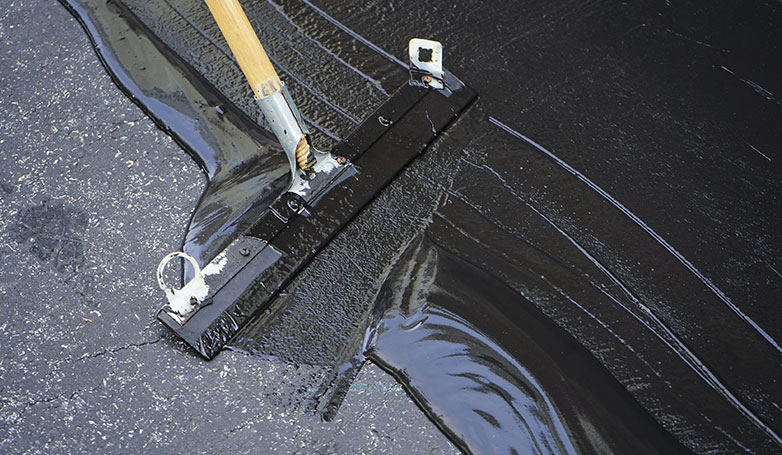
According to the experts, proper asphalt parking lot maintenance can extend the life of your lot to as much as thirty years. Your parking lot is often the first aspect of your business a potential customer sees. A properly maintained lot conveys the impression you care about the appearance of your property.
Maintenance tasks range from simply sweeping the asphalt parking lot and weeding any vegetation growing through cracks to patching cracks before they become potholes and flushing your draining system if necessary. Set a schedule and stay consistent in caring for your parking lot to reach its maximum longevity.
The life expectancy of an asphalt parking lot
An asphalt parking lot won’t last forever, even with perfect site preparation and maintenance. Like most things, your parking lot has a general life cycle it will follow. With proper maintenance, you can expect your asphalt parking lot to last between fifteen and thirty years, at the extremes. Your parking lot will go through several phases during its life.
0-5 Years
Your asphalt parking lot will require little maintenance or repair during the first phase. The parking lot surface should have no trouble standing up to heavy traffic and inclement weather— as long as you have proper drainage. Keep it clean and free of debris, and remove any vegetation you see to prevent future issues.
5-7 Years
Routine maintenance is key. Properly fill any cracks before seal coating your asphalt parking lot. Sealcoating and crack sealing will extend your parking lot’s lifespan, especially if you start early and stay consistent with maintenance. Continue to keep the lot clean and free of weeds.
7-15 Years
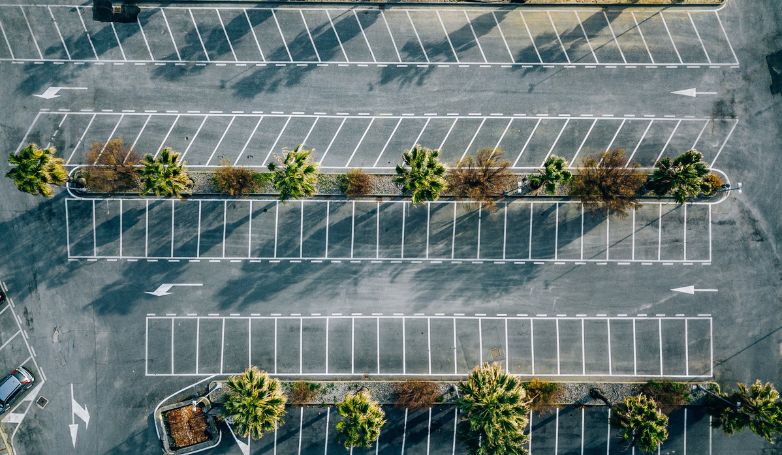
As your parking lot reaches roughly middle age, you may need to do some more intensive maintenance and repair. Cracks may expand to become holes if not dealt with promptly. A neglected asphalt parking lot will show rapidly in the form of growing cracks and potholes.
15-25 Years
Repairs will become more frequent and intensive. You will likely face large cracks and potholes. Customers may complain about the risk of injury or damage to their vehicles. It may be time to consider resurfacing your parking lot.
25+ Years
If your asphalt parking lot made it to 25 years or beyond, you got a fantastic value for your investment. At this point in your parking lot’s life, repair and maintenance costs will be similar to the cost of a new parking lot.
Asphalt parking lot repair
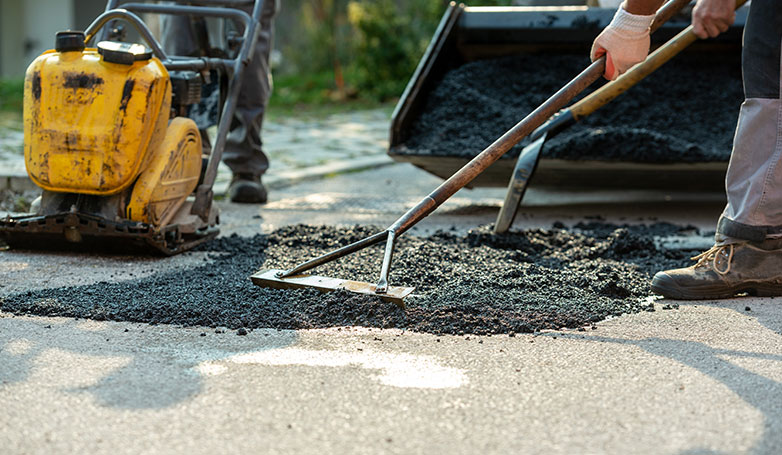
You may be wondering what issues you might face with asphalt parking lot repair. For the most part, cracks and potholes are the bulk of repairs, both of which can be dealt with easily if you take swift action. A parking lot in disrepair gives your potential customers a poor impression of your business before they ever make it through the door.
Cracks are the most common type of asphalt parking lot repair. They can be longitude cracks, which appear in a long straight line; block cracks, which look like a rectangle or square shape and may intersect at right angles; or alligator cracks, which are haphazard patterns. Cracks between a quarter-inch and one inch can be repaired with crack sealing.
Potholes occur when water seeps down through cracks and erodes the roadbed beneath the surface. Vehicle traffic then breaks the surface asphalt and pushes it into the cavity. Potholes can be filled or patched using premium hot or cold mix asphalt after cutting a square around the hole down to the aggregate sub-base. Compacting the new asphalt properly and sealing the repaired area, preventing further water damage is critical.
Asphalt Vs. Concrete: Value Comparison
After learning about the many benefits of choosing asphalt over concrete for your parking lot, it can be useful to see a side-by-side comparison. This chart compares several factors impacting the overall value of your paved parking lot.
| Value factor | Asphalt Parking Lot | Concrete Parking Lot |
|---|---|---|
| Aesthetic Appeal | ✶✶✶✶✶ | ✶✶✶✶✶ |
| Installation Time | ✶✶✶✶✶ | ✶✶ |
| Longevity | ✶✶✶✶ | ✶✶✶✶✶ |
| Environmental Impact | ✶✶✶✶✶ | ✶✶ |
| Maintenance Frequency | ✶✶✶ | ✶✶✶✶✶ |
| Maintenance Intensity/Cost | ✶✶✶✶ | ✶✶ |
The United States Geological Survey conducted an in-depth study on the potential environmental benefits permeable pavement has on the quantity and quality of stormwater runoff. Asphalt and concrete are included in the study, showing the many ways your paved parking lot can help the environment if you have a proper drainage and runoff system.
FAQs about Asphalt Parking Lot
Here are some frequently asked questions (FAQs) to guide you through key aspects such as asphalt types, thickness, and the layers involved in their construction.
e
What type of asphalt is best for parking lots?
The type of asphalt best suited for parking lots is typically dense-graded asphalt mix. This mix consists of a well-graded aggregate, binder, and filler, providing durability and resistance to wear and tear.
How thick is an asphalt parking lot?
The thickness of an asphalt parking lot can vary based on factors such as the intended use, soil conditions, and climate. Typically, the asphalt layer itself can range from 2 to 4 inches thick. However, the overall thickness, including the base and subbase layers, can range from 4 to 12 inches or more.
What are the layers of an asphalt parking lot?
An asphalt parking lot typically consists of several layers:
- Subgrade: The native soil on which the parking lot is constructed.
- Subbase: A layer of aggregate material placed on the subgrade to enhance stability and drainage.
- Base Course: An additional layer of aggregate material that provides further support and load distribution.
- Binder Course: This layer contains a coarser mix of asphalt that contributes to the structural integrity of the parking lot.
- Surface Course: The top layer of asphalt, often a finer mix, designed to withstand traffic and provide a smooth driving surface.
Each layer contributes to the overall strength and durability of the asphalt parking lot. The specific design and thickness of these layers depend on factors such as traffic load, climate, and soil conditions.
Conclusion
When you need a place for your customers’ cars, an asphalt parking lot is the clear choice in terms of value, reliability, speed, and cost. With proper maintenance, repair, and cleaning, you can extend your asphalt parking lot’s lifespan to nearly equal to a concrete lot, with far less time and money invested.

